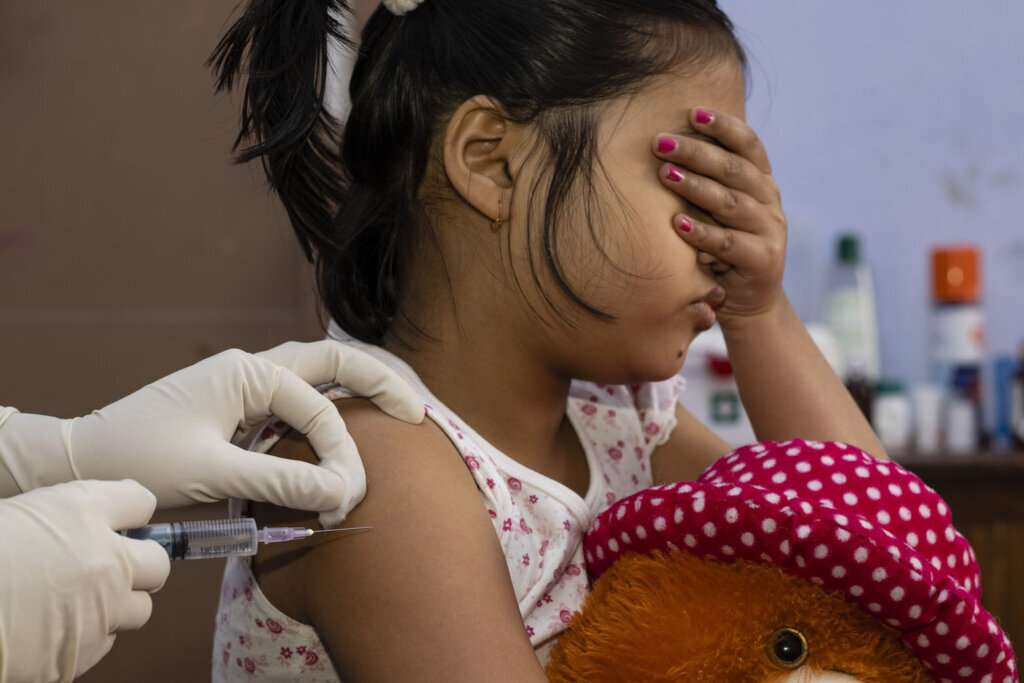
After scattered incidents of children receiving the wrong dose of COVID-19 vaccine, parents are asking what to do if their own child is one of them. Experts are saying: Don’t worry, but be vigilant. Here’s what you need to know.
After numerous incidents of children receiving the wrong dose of COVID-19 vaccine, parents are asking what to do if their own child is one of them. Experts are saying: Don’t worry, but be vigilant. Here’s what you need to know.
In early November, about 110 children ages 5 to 11 were administered a COVID-19 vaccine dose at a pharmacy in Aldie, Virginia, that was intended for patients 12 and older. The Virginia Department of Health has said this “resulted in those children receiving a lower dose than recommended.”
Dr. David Goodfriend, Loudoun County’s health officer, told WTOP the pharmacy incorrectly tried to use the adult vaccine to give kid-sized doses by cutting the adult dose into thirds.
Similar incidents have occurred both regionally and nationwide.
The Centers for Disease Control and Prevention (CDC) has said that vaccine formulas are “not interchangeable.”
As such, they recommend parents contact their health care provider to decide whether to complete the two-part vaccination series with an age-appropriate second shot, or to restart the series completely after the standard 21 days have passed.
The Pfizer-BioNTech vaccine for children consists of two main doses delivered at least 21 days apart.
In many cases, dosing errors occur when combining the vaccine with a diluent — a preservative-free form of saline that gets mixed with the vaccine to determine dosage. Diluent comes packaged separately from the vaccine itself, and the two are mixed for each separate dose.
For children ages 5 to 11, each vaccine is mixed with 1.3 ml of diluent, which comes in an orange cap to differentiate it from the formula used for those 12 and up. That version comes in a purple cap.
According to the CDC, if a child was given less diluent, the dose should not be repeated, and their parents or guardians should be made aware of potential side effects. If the child was given extra diluent, then the vaccine administrator should repeat the dose immediately.
Because the Pfizer-BioNTech COVID-19 vaccine for children 5 to 11 is of a lower dose and different dilution than those for older age groups, some of the children who were given the adult dose have experienced side effects consistent with what some adults experience after their vaccine.
Dr. Kawsar Talaat, a vaccine expert at the Johns Hopkins Bloomberg School of Public Health, told WTOP’s Dimitri Sotis that parents shouldn’t panic if their kid gets more than the recommended dose.
“There’s really nothing that you can do but just monitor them,” Taalat said. “They may have a little bit more of a sore arm. Or, if it’s after the second dose, maybe more fatigue or maybe a little bit of a fever.”
In these cases, though the side effects are more extreme than for the proper dose for kids 5 to 11 years old, the CDC and Pfizer have said the vaccine was tested safely on children at up to three times the normal dose.
Although vaccine dosing errors in Virginia and California have received a lot of attention, Dr. Talaat says these mistakes are rare and that vaccinations are still largely safe.
For parents who want to ensure their child is getting the right dose for their age, knowing the basics and asking the right questions is key.
The American Pharmacists Association have made the following recommendations to ensure your child gets the right vaccine dose:
- When you make an appointment, make sure to register your child for the right age group: PEDIATRIC for children 5-11, and ADOLESCENT for children 12 and up.
- When arriving for your child’s appointment, confirm with your provider the version of the vaccine your child will be getting (PEDIATRIC/ADOLESCENT).
- As your child is preparing to get their shot, observe whether the vial has an orange or purple cap. If it is orange, then it is designed for ages 5-11. If it is purple, then the vaccine is for adolescents (12 and up) and adults.
Dr. Talaat says that parents should pay attention and ask questions (politely) when providers administer their child’s vaccine.
“Is this the pediatric vaccine? Is this the right dose for my child? Are you drawing up the right volume? Was it diluted correctly? These are all things that parents can ask.”
WTOP’s Dimitri Sotis and Jack Moore contributed to this story.
Stay connected with us on social media platform for instant update click here to join our Twitter, & Facebook
We are now on Telegram. Click here to join our channel (@TechiUpdate) and stay updated with the latest Technology headlines.
For all the latest Health & Fitness News Click Here
